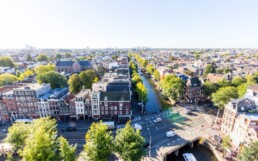Why You Need an Expert Agent to Buy an Amsterdam Home
Wondering what makes Barry the top buying agent in Amsterdam? Beyond his friendly, personable service, excellent reputation, and unique service level, Barry's deep market knowledge and years of experience make him the ideal guide for any expat searching for their dream home.
Navigating the housing market in the Netherlands is challenging, especially in the Amsterdam region, where only about 30% of people own homes. This low ownership rate creates a high demand with limited supply. If you're moving from abroad, Barry can help make your transition smooth and hassle-free, ensuring you find the perfect property for your new life in the Netherlands.
Here are some of Barry's most frequently asked questions from first-time buyers to give you an insight into how his service works.
1. I have never bought property before. Where do I start?
First, determine your budget by assessing your savings and mortgage eligibility. The very first step is to find out how much you can borrow. The market is highly competitive, so you need to be ready to act quickly. Consulting a mortgage expert is crucial, and we can help with that.
You can borrow up to 100% of the property’s value, but you'll need an additional 4-6% of the property's price to cover taxes, estate agent fees, notary fees, and other expenses. Once you know your numbers, make a list of requirements and start your search online. Keep in mind that properties in the Amsterdam region often sell above the asking price. We'll always be honest with you about whether your expectations align with reality.
2. Why is it important to have an estate agent who understands my requirements?
A good agent understands your needs and explains what is feasible, making the process smooth and successful.
3. What are the benefits of working with an experienced estate agent from an expat perspective?
An experienced agent will guide you through the process, avoid pitfalls, and ensure the deal is completed smoothly. Sellers prefer working with experienced buying agents. The title "makelaar" is not protected, so make sure you team up with someone who has a diploma and knowledge.
4. Cost breakdown: If I spend €600,000 on a property, how much goes to my estate agent as commission, and what is my return on investment in choosing Burgemeester Vastgoed?
Depending on the transfer tax bill (approximately 2%), expect to pay around 5% of the purchase price in total fees. The commission for working with BV is 1.5% ex VAT. BV offers excellent responsiveness and high-quality service, ensuring a knowledgeable and personal approach. If there's a deal to be made, we'll make it happen!
5. If I have a dispute with the seller, how can Burgemeester Vastgoed assist me?
We will support our clients as much as possible. If the issue is beyond our expertise, we will advise you on the necessary steps and connect you with the right organizations to resolve the issue.
6. Negotiations are not my strong point. How does Burgemeester Vastgoed secure the best price for me, and how is this different from other agents?
At BV, we assist our clients from start to finish and negotiate the best deal possible. Our goal is client satisfaction, and we pride ourselves on our unique, personable service.
7. I’m choosing between Burgemeester Vastgoed and a cheaper, less experienced agent. Why should I choose Barry?
Value is key; choosing a cheaper agent often means lower-quality service. We provide a high level of service and charge a consistent percentage to ensure this quality. If you're serious about finding your dream home, we'd love to chat with you. Call or email us now for an appointment, and take the first step toward securing your perfect property.
For more information or to schedule an appointment, contact Barry Burgemeester at info@burgemeestervastgoed.nl today!
Expert Tips for Bidding on a Home in the Netherlands
Bidding on a property is a skill honed over years of experience. Having an expert on your side, like Barry Burgemeester, can make all the difference. Barry combines diligence with extensive knowledge to help you get the best deal. We recently sat down with Barry to answer common questions about bidding on a home in the Netherlands.
What does it mean to 'bid' on a house in the Netherlands?
Bidding on a house shows your interest in purchasing it—it’s more than just a price offer; it's a proposal. Sellers consider factors like flexibility, financing conditions, and budget. If you're unsure about presenting yourself in the best light, a real estate agent can guide you through the process.
What happens during the bidding process?
Your real estate agent will draft and submit your offer to the seller or their agent. To make you an appealing candidate, your agent will help you create a compelling profile. With many competitors vying for the same property, thorough preparation is essential.
Why should I use a real estate agent to bid on a home?
Securing your dream home involves many fast-moving parts, often negotiated in Dutch. Without fluency in the language and familiarity with the market, it can be challenging to keep up. A skilled real estate agent ensures you bid on properties that offer good value and fit your budget.
What should I know about overbidding?
The Amsterdam market is highly competitive, often requiring overbids. Determining the right amount to overbid is tricky, but a seasoned real estate agent can provide strategic advice to benefit both you and the seller.
How do I finance a bid when overbidding?
Before bidding, you need to understand the extra costs involved in overbidding. A real estate agent like Barry, with his extensive experience, can help you estimate the total cost. This way, you can secure your finances and be ready to act quickly.
What happens if I win the bid?
Congratulations! But remember, the initial verbal agreement or email confirmation isn't binding. A deal becomes binding only after all parties sign the sale and purchase agreement. Barry will guide you through this process smoothly and answer all your questions.
Get in Touch with Barry Burgemeester
Bidding can be daunting, especially in an unfamiliar market. However, with the right real estate agent, you can feel confident that your interests are prioritized. For a free consultation, email info@burgemeestervastgoed.nl today.
About Barry Burgemeester
Barry Burgemeester is a certified real estate agent with over 23 years of experience. Originally from Utrecht, he is passionate about helping clients in Amsterdam and beyond. Specializing in assisting expats, Barry expertly guides them through finding their dream home every step of the way.
The Dutch Housing Market: Trends, Government Plans, and Practical Tips
The housing market in The Netherlands is marked by high demand and limited supply, with the average house price now at €434,000. Haarlem, with an average price of €576,000, is the most expensive city, reflecting intense competition in urban areas. Even the outskirts of towns and regions like Limburg are experiencing high demand, creating a nationwide seller’s market where 56% of homes are sold above the asking price. Buying a house is quite a challenge, especially in the Amsterdam region, where only about 30% of people own homes. We will try to explain what is happening.
Government Housing Initiatives
One of the steps made to address these issues is the government’s plan to redistribute housing construction to the eastern and northern regions of the country. These areas offer more space and are less prone to flooding, aligning with climate resilience goals. This strategy aims to reduce pressure on the west and south, stimulate local economies, and foster balanced regional development.
Construction Challenges
However, the construction sector faces significant hurdles. Only 55,000 permits for new builds were issued last year, far below the needed number. High construction and labor costs and bureaucratic challenges make it difficult to scale up housing development, worsening the supply shortage.
New Builds vs. Existing Homes
Newly built homes offer several advantages: they are more sustainable, require less maintenance, and come with guarantees for any issues. However, high ground costs, construction expenses, and long building times can significantly impact your financial situation. For those needing a bridging loan to transition between homes, it is crucial to understand the terms set by banks. Such loans are less common now, and banks are more stringent. Finding an existing home might be a challenge, but the time from purchase to move-in is short, allowing you to enjoy your new home quickly.
Mortgage Rates and Financial Considerations
Current mortgage rates average 3.91% for a 10-year term, but banks are increasingly cautious. Securing a mortgage can be challenging if you do not have a steady job or have other financial obligations. Potential buyers need to be well-prepared and understand the stringent requirements that banks now impose.
Rental Market and “Wet Betaalbare Huur”
Homeownership is increasingly unaffordable for many, and the rental market also faces shortages. The new “Wet Betaalbare Huur” law aims to ensure fairer rents, with the government estimating that 300,000 homes will have to lower their rents. This law is controversial; while it seeks to protect tenants, it may lead developers and investors to sell properties, reducing rental availability and discouraging new construction.
Practical Tips for Navigating the Housing Market
- Seek Professional Guidance: Always consult with a real estate professional to help navigate the complexities of the market.
- Stay Realistic: Adjust your Wishlist to match what is feasible within your budget and the current market conditions.
- Set Priorities: Clearly define your priorities and follow the advice of experts to make informed decisions.
- Important Clauses: Do not skip critical clauses like financing reservations and surveys, even if it seems convenient.
- Set Boundaries: Establish clear boundaries for what you can afford and what compromises you are willing to make.
- Be Prepared and Patient: Be ready for a competitive market and practice patience as finding the right home may take time.
Conclusion
As a certified real estate agent with over 23 years of experience helping expats buy homes in the Amsterdam area, I understand the complexities of the Dutch housing market. With significant imbalances and regional disparities, navigating these challenges effectively is crucial. Government initiatives aim to promote sustainable growth, but new rental laws and construction hurdles add layers of complexity. You can find your dream home by staying informed and following practical tips.
For personalized assistance, feel free to email me at info@burgemeestervastgoed.nl
From Bid Disappointments to Home Search Success
At Burgemeester Vastgoed, we empathize with the whirlwind of emotions that homebuyers go through, particularly when dealing with the letdown of missing out on a dream home bid. It might seem like the perfect house is always just out of reach, but don’t lose hope!
Buying a home is a major milestone, so it’s crucial to take care of yourself and avoid feeling overwhelmed during the process. To help you maintain your balance, we’ve put together five tips that could make a difference.
Acknowledge your feelings
Feeling disappointed and frustrated after losing out on a bid for a home is okay. Allow yourself to acknowledge these emotions without judgment. Ignoring or suppressing your feelings can prolong the healing process.
Stay realistic
In this housing market, there might be someone with bigger pockets than yours. Understand that there are limitations to what you can afford and prioritize financial prudence. Take the advice from your real estate agent seriously and avoid stretching beyond your means.
Focus on what you can control
Although you’ve missed out on a particular home, there’s still much you can influence. Take proactive steps by reassessing your goals, finances, and housing preferences. One exciting avenue to explore is venturing into different neighbourhoods, maybe even going further than your desired location.
Practice self-compassion
Be kind to yourself during this time. Remind yourself that not winning a bid does not diminish your worth or abilities. Treat yourself with the same empathy and understanding that you would offer to a friend facing a similar situation. Engage in self-care activities that help you relax and recharge.
Maintain perspective
Even when you give it your all, external factors like better offers can sway the outcome. Remember, not winning a bid doesn’t mean you fell short. Stay focused on what you can influence, practice self-compassion, and keep searching for your dream home. This approach helps you cope with regrets and stress, ensuring you move forward positively.
We believe there’s a perfect home out there for everyone. Sometimes it may take a bit longer to find, but staying resilient is key, especially when you have the support of the right estate agent.
Feel free to send an email via info@burgemeestervastgoed.nl to discuss your adventures and see how we can work together.
A Complete Guide to Real Estate ABC: Essential Dutch Terms
When buying a home in The Netherlands, the real estate market involves grasping these Dutch terms. A clear understanding of these words will empower you to make well-informed decisions. At our company, we aim to provide you with the best information possible and to be transparent every step of the way. That's why we've created this Guide to Real Estate ABC—to help demystify the process and ensure you have the knowledge you need to make confident choices.
We've also produced numerous videos on home buying and interesting blogs.
Here's Your A-Z Guide:
- Afsluitprovisie (Closing Commission) When buying a home this means the closing commission. This fee, tied to mortgage closure, should be factored into your overall budget.
- Akte van Levering (Deed of Transfer) A vital document in Dutch real estate, transferring ownership from seller to buyer.
- Akte van Splitsing (Deed of Division) In apartment living, "akte van splitsing" details property division, defining ownership and shared responsibilities within a building.
- Anti-speculatiebeding (Anti-Speculation Clause) An important clause in property contracts that restricts the buyer from selling or transferring ownership for a specific period, discouraging speculative practices.
- Appartementsrecht (Apartment Right) It signifies the right of ownership and use of a specific part of a building, maintaining the unit's integrity without the authority to divide it
- Bankgarantie (Bank Guarantee) This serves as security, assuring the seller that the buyer has the financial means. The bank guarantees the seller up to a certain amount, deposited in a third-party account at the notary's office.
- Beschermd Stadsgezicht (Protected City View) This term refers to a designated area or landscape within a city that is legally protected from development or alteration to preserve its visual appeal or cultural significance.
- Blokverwarming (Block Heating) It's a central heating system serving multiple units in the same block.
- Bodemrapport (Soil Report) A document detailing soil composition and suitability for construction.
- Bouwkeuring (Building Inspection) This assesses the property's structural integrity, revealing potential issues that influence the property's value.
- Courtage (Commission) The commission paid to real estate agents. Understanding this term ensures transparency in your agreement, clarifying the financial aspects of their assistance.
- Eigendomsoverdracht (Transfer of Ownership) This is when legal delivery or transport of property occurs on a pre-agreed date.
- Energie Label (Energy Label) An energy label is a certification indicating the energy efficiency of a building or appliance.
- Executiewaarde (Foreclosure Value) In case of financial struggles, foreclosure may lead to a forced public sale of property by the bank at a value often lower than the market price.
- Hypotheek (Mortgage) This grants a lender rights to a borrower's property, often referred to as the loan itself.
- Hypotheekakte (Mortgage Deed) A notary-drafted document that pledges the property as collateral to the lender, outlining rights and obligations.
- Informatieplicht (Disclosure) Property owners are legally obliged to reveal information, such as structural conditions, that could influence a sale.
- Kadaster (Land Registry Office) This is where ownership rights of land and property are publicly recorded.
- Koopovereenkomst (Sale and Purchase Agreement) A binding contract obligates a transaction between a buyer and seller.
- Koopsom (Purchase Price) The agreed-upon amount by the buyer and seller is stated in the purchase deed.
- Kosten Koper (Buyer's Costs) As a buyer, you are obliged to pay costs such as transfer tax, cadastral rights, and notary fees.
- Lijst van Zaken (List of Moveables) It's an inventory of portable items like furniture and appliances that can be easily moved from one place to another.
- Maisonette A house with living and sleeping areas on separate floors.
- Makelaar (Real Estate Agent) Mediates property transactions exclusively for clients, serving their interests. An agent is a negotiator, not a trader. Since 2001 anyone can call themselves a real estate agent.
- Meetrapport (Measurements Report) A document detailing the dimensions and specifications of a property or structure.
- Nota van Afrekening (Settlement Statement) A bill of settlement, drawn up by a notary. It details transaction costs like transfer tax and brokerage fees, costs for registration, closing costs of any mortgage loan and the estate agent fee.
- Notaris (Notary) The notary is a public official appointed by the King and will take care of the transfer of ownership of a house and mortgage. He or she is responsible for registering the deed of transfer at the Land Registry and registering the mortgage in the mortgage register.
- Ontbindende Voorwaarden Agreement becomes void if certain conditions aren't met.
- Overbruggingskrediet (Bridge Loan) Uses equity from an old home to bridge the gap between buying a new one.
- Passeren (Passing) Formal signing of property documents at the notary's office.
- Service Kosten (Building Fees) Covers common expenses in apartment buildings, like insurance and maintenance.
- Souterrain A cellar partly above street level.
- Taxatie (Valuation) Assesses property value by a (sworn) appraiser.
- Transport Akte (Deed of Transfer) Records property ownership change, registered with the land registry.
- Vereniging van Eigenaren (Owners' Association) Represents homeowners' interests in shared buildings.
- Vrij op Naam (VON) Legally required costs are included in the purchase price, excluding mortgage costs.
- WOZ (Wet Waardeering Onroerende Zaken) This law brought uniformity in the valuation of immovable properties and is the value of the house if it were to be sold empty to the highest bidder or the free market value
- Wet ter voorkoming van Witwassen en Financieren van Terrorisme (WWFT) The WWFT, or "Law for the Prevention of Money Laundering and Financing of Terrorism," mandates that parties like Real Estate Agents, Financial Institutions, and Notaries verify client identities, conduct due diligence, report unusual transactions, and maintain records. This is to combat money laundering and terrorist financing by detecting and preventing illicit activities in the financial system. As part of this, they may ask for proof of identity and income from clients.
At Burgemeester Vastgoed, we're on a mission to make everything as clear as possible. If you want to know more or add a term to the list, feel free to reach out via info@burgemeestervastgoed.nl or visit our website's contact page.
Happy house hunting!
High Demand for Homes in Amsterdam
I have more than 20 years of experience assisting expats in finding homes. Amsterdam's popularity as a place to live has surged, but the housing supply hasn't kept up with the demand. Unlike many cities where more people own homes, Amsterdam is different. Only about 30% of properties in the city are owner-occupied.
Now, in my professional opinion, I'll dissect the situation step by step to provide a clear understanding. The majority of properties in Amsterdam are used for social housing, offices, and other purposes, which significantly limits the number of available homes for purchase. This supply-demand mismatch makes it tough, but not impossible, for people to find suitable places to live.
A Natural Shortage explained
- Homes Are Getting More Expensive
Houses in Amsterdam are becoming fancier and pricier. This is good news if you can afford to buy a great home, but it's a problem for many others. We don't see an end to it – prices in the middle and upper segments, going over 500,000 euros, are expected to keep going up. Meanwhile, the lower-priced homes are in high demand, with an average of 11 people wanting to buy each one, which means prices are going up there too.
- Building New Homes Is Slow
In a lot of places, making new houses helps when there aren't enough. But in Amsterdam, it's not happening fast. Why? Well, there's not much space, strict rules about building, and it costs a lot to build, so it's tough to match the growing need.
- Tangled Up in Rules
Amsterdam's housing market is caught in a web of rules and regulations. Some are important for the environment and safety, but too many can tangle up construction and slow things down. This only adds to the challenge of finding a suitable home.
In a nutshell, Amsterdam's housing problem is complex. With only approximately 30% of homes owned and the rest used for social housing and other purposes, the city faces unique challenges. Finding solutions to make Amsterdam more accessible to everyone is essential. Keep in mind, that I don't have a crystal ball, and like all complex topics, government policies play a significant role. Hopefully, we'll see progress, but it might not be immediate.
Why a Certified Real Estate Agent Matters
Amsterdam's housing market is quite competitive. That's why having a certified and well-known real estate agent with you, like me, is super important. Homes for sale can come and go fast, and a pro can be a big help. Agents like me understand the market well. We can act quickly when new homes are listed and help you make smart choices.
In the Netherlands, real estate agents get paid by either the seller or the buyer, not both. So, selling agents prefer working with people who have professionals on their side because it makes deals more likely to succeed. Having a trusted agent can be the secret to finding your dream home in Amsterdam's challenging housing market.
If you'd like to chat or have any questions, feel free to reach out via info@burgemeestervastgoed.nl.
Property defects: understanding your rights
As an experienced and certified purchase estate agent in #amsterdam , I've helped many expats find their dream homes. In my opinion, buying a new home should be a joyful and stress free occasion. However, what if you encounter defects in your recently purchased property? Let's dive into it.
Under Dutch housing law, the purchase and sale of a residential home require a written agreement called the purchase- and sales agreement. This agreement covers essential aspects like price, conditions, finance clauses, and property information. It can be a standard NVM agreement, an so called Amsterdam's Model like we use in Amsterdam, or a custom agreement, as long as it complies with Dutch law.
The language used in the purchase and sales agreement is vital for protecting your rights. That's why it's crucial to have guidance from someone like me who understands the importance of clearly stating essential information.
When buying an existing home with previous occupants, the moment of ownership transfer is key to addressing any defects. As the owner, you take responsibility for the property. Older properties may have natural wear and tear that isn't anyone's fault. For example, you might encounter leakage or a sagging floor after a few months.
The purchase and sales contract often states that the previous owner can't be held responsible for such age-related issues. If you face significant issues that impede your use of the property, legal action may be an option, but it's important to understand your rights and obligations first.
Seller's obligation: Disclosure
The seller is legally obligated to disclose important information about the property, including its condition and the surrounding environment. Failure to disclose hidden defects or issues that impact the property's residential use may be a breach of contract. Examples include hidden asbestos or unsafe wiring. Sellers must provide this information to avoid accountability for resulting issues.
Buyer's obligation: Examination
Buyers are responsible for conducting a reasonable examination of the property. This determines what they could have reasonably known based on legal standards. If a defect is clearly visible or discoverable during examination, it becomes challenging to argue it as a breach of contract. The extent of investigation required depends on the property's age.
When can the contract be breached?
To determine if a defect qualifies as a breach of contract, consider three factors:
- what is specified in the purchase and sales agreement
- whether the defect is essential to the deal
- what is considered reasonable under Dutch Law
A defect must significantly impact your ability to use the property or have played a crucial role in your decision to purchase.
If you encounter problems after you became the owner, contact your purchase agent for assistance. If you bought the property without an agent, consult a real estate lawyer for guidance. It's a good idea to try negotiating to resolve property defect disputes.
Different rules apply when purchasing newly built houses!
Getting a professional structural inspection and report is often a wise investment if you need to hold the seller accountable later on for major defects. Sometimes this is not needed, if we have recent knowleadge and recent data on the property.
Are you in the process of searching for a home to buy?
To navigate this competitive market, it's advisable to work with a certified and experienced real estate agent like myself. I'll examine the agreement, inspect the property for visable defects myself, and address financing or architectural concerns if necessary. I understand that the information provided in this article may be overwhelming. Feel free to reach out to me for a chat. We can discuss the possibilities of working together and explore how I can assist you in your home buying journey.
Decoding the current avarage house prices in Amsterdam
 Buying a home in Amsterdam? The actual average house price is currently € 571 568, but what does that say?
Buying a home in Amsterdam? The actual average house price is currently € 571 568, but what does that say?
As a certified purchase agent with over 23 years of experience, I know that when it comes to property prices, it’s essential to understand that prices can vary significantly from street to street, but how is that?
In Amsterdam, each neighbourhood has its own unique charm, character, and amenities, which can influence property values. But even within the neighbourhood prices can differ significantly. Certain streets are more desirable and more expensive per m2 price than other streets, so the average and current price per m2 of € 7 189, is not standard for all homes.
When it comes to determining property prices, several crucial factors come into play. Factors such as size, condition, layout, and renovations all significantly impact the value of a property. Additionally, even within the confines of a single neighbourhood, you may find a diverse range of properties on the same street, each possessing unique characteristics that contribute to price variations.
Therefore, relying solely on average prices may not provide an accurate representation of the dynamic real estate market. Evaluating the market value of each property individually is of utmost importance.
How About the future prices?
Predicting home prices in Amsterdam is a complex task influenced by numerous factors. While I don’t possess a magic ball, my expertise and knowledge of the market and recent sales are the basis of my advice.
Currently, the housing market in Amsterdam is extremely tight, with significantly more demand than supply. This has resulted in a competitive market for buyers. The demand for homes in Amsterdam continues to rise steadily, driven particularly by the city’s popularity. In Amsterdam, we only have 33% home ownership, so that explains a lot.
Over the past couple of years, we have been fortunate to benefit from remarkably low mortgage rates. However, it is encouraging to witness these rates gradually stabilizing towards more typical levels. As a result, it’s important to acknowledge that borrowing capacities may be slightly reduced due to the rise in mortgage rates, so it is always wise to visit a bank or a mortgage advisor and get your numbers clear.
It is crucial to emphasize that the housing shortage in the market continues to persist, driving sustained demand for available properties. The reality is that finding a desirable home remains a challenging task, as there are multiple interested buyers for every property available.
What now?
So, if you are considering purchasing a home in Amsterdam, I provide a tailored approach that considers your unique requirements, preferences, and budget. We do not work with multiple clients who have the same criteria, as we believe in avoiding competition among our clients, we will keep you safe and we work on a no-cure/no-pay base.
Rest assured, if you maintain a realistic view and are open to following our advice, we are committed to finding you an exceptional home where you can create lasting memories.
Call me today for a personalized consultation, and let’s embark on this exciting journey together!
The Energylabel
The Netherlands has been at the forefront of adopting policies and initiatives to reduce energy consumption and promote the use of renewable energy sources. One of these initiatives is the energy label, which provides information about the energy efficiency of a building to potential buyers or renters.
WHAT IS IT?
An ‘energielabel’ (Energy Performance Certificate – EPC) shows the energy efficiency of a property. The EPC also notes potential energy-saving measures for a property.
The label takes into account factors such as insulation, heating and cooling systems, ventilation, and renewable energy sources. The label is valid for 10 years and can be obtained through a certified energy advisor.
WHY DO I NEED IT?
When buying a home in the Netherlands, it is important to consider the energy efficiency of the property. This is where an energy label comes in – a certification that rates a property’s energy performance on a scale from A to G. The label is mandatory for all homes being sold or rented out.
Also, it can help you make an informed decision about the property you are considering. A higher rating means that the property is more energy efficient and will cost less to run, which can save you money on utility bills in the long run. It can also indicate that the property is more environmentally friendly, as it is using less energy and producing fewer greenhouse gas emissions.
REALLY, CAN IT SAVE ME MONEY?
Well, it is worth noting that the energy label is not a guarantee of energy efficiency, as it is based on theoretical calculations and does not take into account factors such as user behaviour. However, it can still be a useful tool for comparing properties and making informed choices.
HOW DO I GET IT?
First, look if your home already has an energy label at https://www.ep-online.nl/
The application is no longer completed online. You have to make an appointment with a certified energy adviser, that will visit your home. Make sure you have as much as relevant documents available when the advisor will visit your home. Documents about the house, drawings, pictures, receipts, if you have refurbished or upgraded the house than add the bills and any other relevant information you might have.
ARE THERE ANY EXEMPTIONS?
If you own a monument build, you may be relieved to know that you do not need an energy label. The reason for this exemption is that monument builds are considered to be part of our cultural heritage. They are protected by law to preserve their historical and cultural value. As a result, any structural changes or renovations to the building must be carried out with extreme care and in accordance with strict regulations.
For all other exemptions we recommend you to visit the website of the government (Dutch).
Any questions left? Give us a call!














